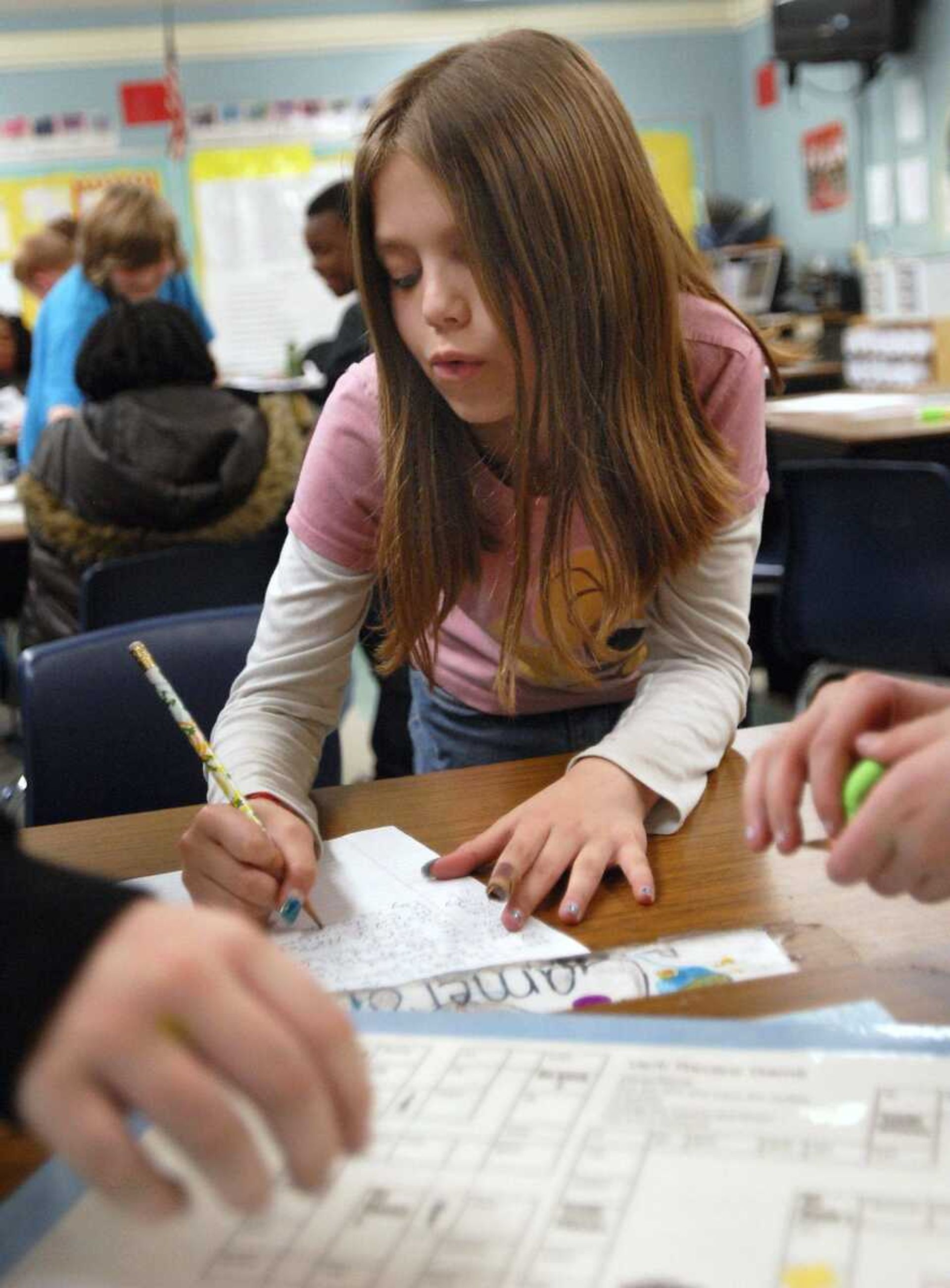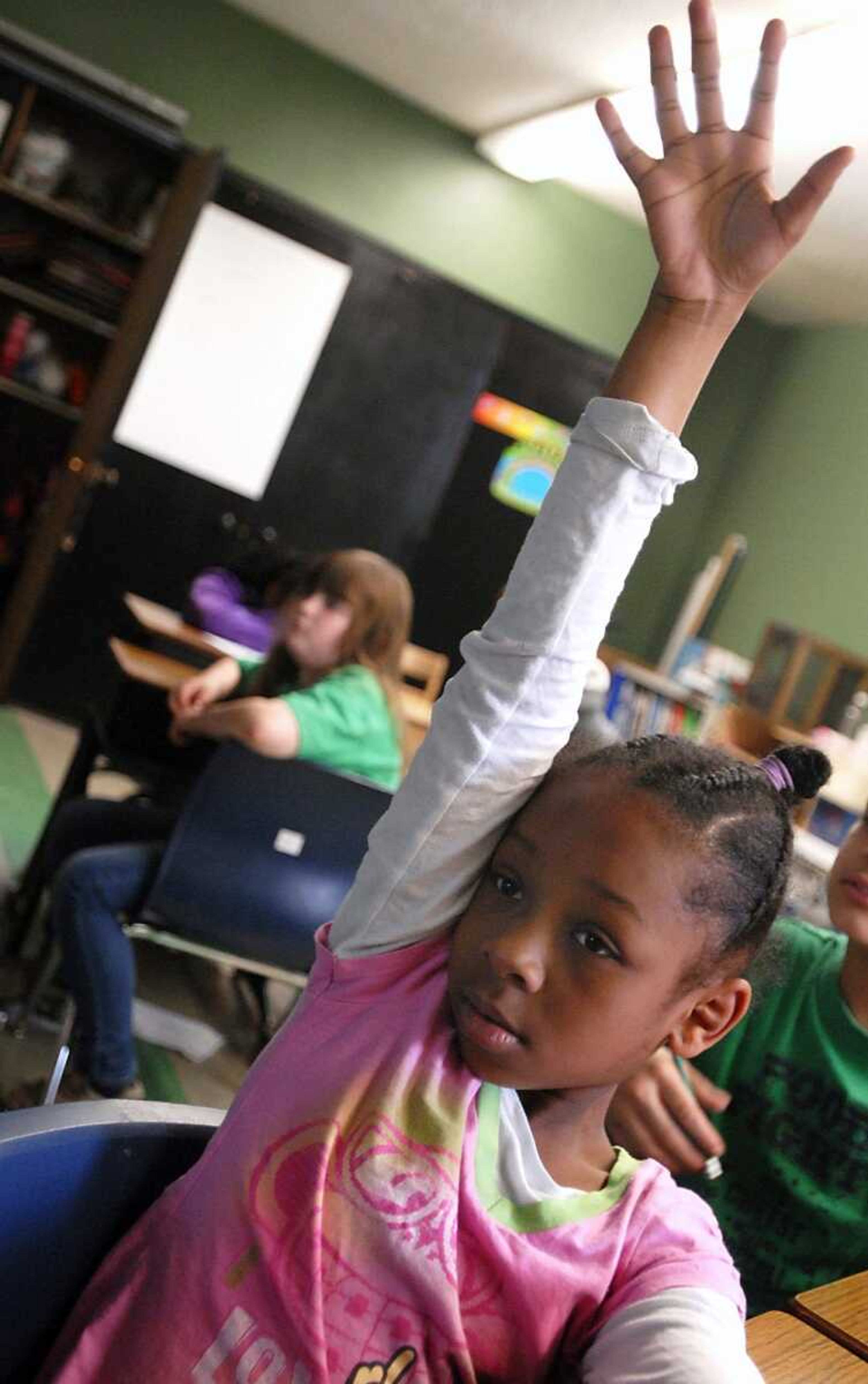Sorry, Jetsons.
Lauren Hoxworth and her fellow fourth-graders at Jefferson Elementary School don't see flying cars as part of their future in the next decade. Frankly, they've never heard of "The Jetsons," the futuristic cartoon that envisioned robot maids, skybound apartments and fast interstellar travel.
But Lauren predicts modes of transportation will be much more intelligent in 2020.
"Probably in 10 years cars will be very different. They'll probably be, like, voice-activated, when you just have to say a direction and it will go there," the 10 year-old said.
For those who grew up watching "The Jetsons" in the 1960s and again in the '80s, Jefferson's classrooms might seem futuristic.
On Thursday afternoon, Lauren and her classmates communally worked on equivalent fractions on the class' SmartBoard, an interactive projection display with centralized control of audio and visual equipment.
Meet the class of 2019 -- students who were effectively born with technology in their hands. And as rapidly as technology has evolved in their lifetimes, that promises to be prologue to some amazing technological advancements by 2020, when the members of the fourth-grade class of 2011 are finishing their first year of post-secondary education.
Seeing the future
A Southeast Missouri State University committee is charged with imagining the college student of 2020, and what the university must be to meet the future demands of a college education.
"There are a lot of changes going on in universities now with advances in technology," said Bill Eddleman, chairman of Southeast's Department of Biology and chairman of the "Southeast in the Year 2020" Steering Committee. "We want to be fully prepared for those changes, and how those changes will affect us."
The eight-member committee -- made up of faculty, a member of information technology, and a student representative -- has been meeting since January and will spend the better part of the next year assembling its recommendations. Subcommittees are addressing everything from the future of student services and the role of faculty to curriculum and student demographics. But the most critical area of study is technology.
David Wilde, a member of Southeast's IT department and part of the 2020 committee, admits the visioning process is challenging. Life has exponentially changed since his first computer, an Atari 800 with scant memory compared to today's most basic smartphone.
"I have a 4-year-old in a preschool class, and they have two computers. He plays on my wife and I's iPhone like it's second nature," Wilde said. "It's amazing to think of not only what the technology will be but what his life in education will be."
The college classroom of the next decade will rely more on online learning, according to Southeast provost Ron Rosati, who, along with Southeast president Dr. Ken Dobbins, serves as an ex officio member of the committee.
Online sections of courses this summer are outpacing last summer, Rosati said. As of April 1, the university posted 212 sections online, up 53 from last summer. Summer enrollment online has surged to 4,055 courses committed to, up from 1,600 last year. Summer enrollment in total is up 1,000, and all of that is attributed to online growth, Rosati said.
"Our online programming will be about half of our programming this summer," the provost said. The 2020 committee has been charged with coming up with online learning recommendations by June.
The Chronicle of Higher Education in 2009 released "The College of 2020" report, which, in part, envisions a majority of classes online, based on surveys of U.S. colleges and universities.
Teaching the future
Beyond technology, the teacher of 2020 will be different, committee members say. The old lecture hall will give way more and more to group interaction, the influence of the Internet and social networking.
"In the past, faculty has been seen as the primary source of information. Now they will be seen as experts or guides, knowing where the sources of information are, helping others access sources of information," Rosati said.
The trend toward paperless campuses will continue, committee members say, with electronic textbooks. Differentiating good data from bad in the dizzying Information Age will be the domain of higher education, Rosati said.
The visioning process also addresses what the student of 2020 will look like. Demographic shifts nationwide and an influx of international students will undoubtedly change the face of Southeast students in the decade ahead, Eddleman said. And there will be more students, presumably, based on enrollment trend and Gov. Jay Nixon's push for 60 percent of Missouri's population to attain a post-secondary degree.
The average age of students will continue to trend higher, "The College of 2020" report projects, with continuing education playing an ever-increasing role in the job market.
With so much mobile technology, the question is will a physical university be necessary in 2020? Most definitely, 2020 committee members say.
"I think there will be certain percentage of the population that wants and needs face-to-face communication and instruction," Wilde said.
Camari Jones, a Jefferson Elementary fourth-grader, finds it hard to imagine what the college classroom of 2020 will look like, but she's certain of one thing:
"It will be amazing," she said.
mkittle@semissourian.com
388-3627
Pertinent address:
One University Plaza, Cape Girardeau, MO

520 S. Minnesota Cape Girardeau, MO
Connect with the Southeast Missourian Newsroom:
For corrections to this story or other insights for the editor, click here. To submit a letter to the editor, click here. To learn about the Southeast Missourian’s AI Policy, click here.







